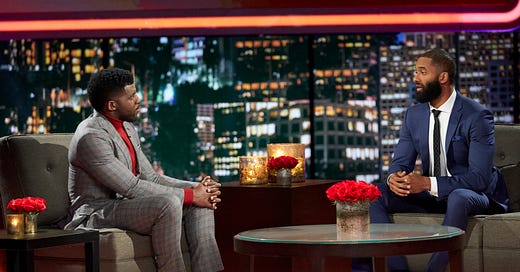This season of The Bachelor ended much the same way the previous twenty-four seasons have. Bachelor Matt whittled his bevy down to one woman, Rachael, and she accepted his final rose. What they didn’t know while filming the finale months ago is that the audience would be hearing rumors about Rachael’s racially insensitive past at the same time the first Black Bachelor was falling in love with her. There would be no hints of this dynamic in the since-wrapped footage of the contest, but both Matt and Rachael were forced to confront the ramifications in front of a camera during the customary “After the Rose” special that airs directly after the finale.
We’re usually lamenting the unrealistic nature of the show’s premise or groaning at the overt provocations of a given season’s antagonist, so this felt different as it may have been the first time we’ve had the opportunity to feel deeper real-world feelings along with the Bachelor. While we should acknowledge a long tradition of people of color suffering for the entertainment or profit of white people, Matt’s emotion was evident, and no matter the makeup of his disappointment, it was a human experience to be shared. On a night when they’d usually be talking about where they were planning to start the next phase of their life together, Matt and Rachael instead talked about where she might start educating herself on why her actions were harmful and where she can go from here (without Matt).
We watch shows like The Bachelor to escape the brutal realities of our everyday existence so when these ugly truths come calling on TV, it’s a bit jarring…and a lot like real life. After a summer of protests and the selection of the first Black Bachelor, not even the most proficient producers and casting professionals could have concocted a drama so rife with the actual problems in American society, and those ratings monsters are probably more than a little upset that none of this unfolded within the confines of their carefully controlled production.
When reality catches up with reality TV, what should we take away from it? What Matt reminded us of during his reflection on Rachael’s past is that, as a Black man in America, he’s not able to take a night off from thinking about these things so it’s well past time the rest of us weren’t able to numb or distract ourselves from the war outside the walls. With that in mind, while the circumstances that brought these conversations about are unfortunate, the fact is that the audience for The Bachelor is heavily white and female and thus gives many viewers an opportunity to put themselves in Rachael’s shoes and think about the ways in which they’ve committed microaggressions or worse that were harmful to people of color.
I do believe that Rachael was excited to get to know Matt and that she never once considered having anything to hide in terms of compromising images or posts from her past, but that’s also part of the problem. Until we plumb our own pasts and examine the ways in which we’ve even unknowingly caused harm to people of color, we can’t move forward in a meaningful way as better allies. To Rachael’s credit, she showed up for the after-show and committed to moving forward in a positive way. I do hope that she takes her medicine, does the work, and grows from this experience. I’m even more keen to find out if any viewers are inspired to take similar actions.
Back in Bachelor world, the franchise has already announced a Black co-host for the next installment of The Bachelorette in place of Chris Harrison, but we’ll have to see if this is a temporary fix or a trend for the future. If past mea culpas that have transitioned back to the status quo once the dust settles are any indication, I wouldn’t count on The Bachelor/ette to solve our original sin.




